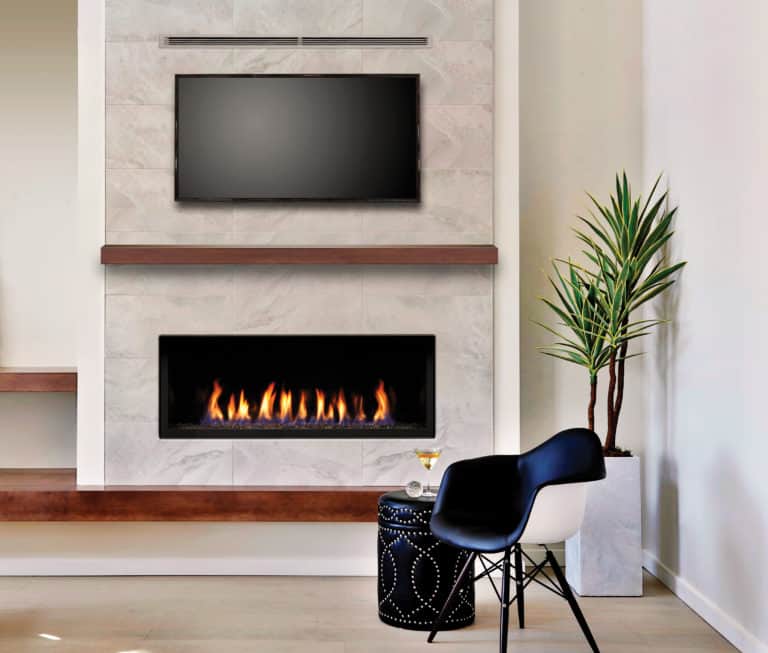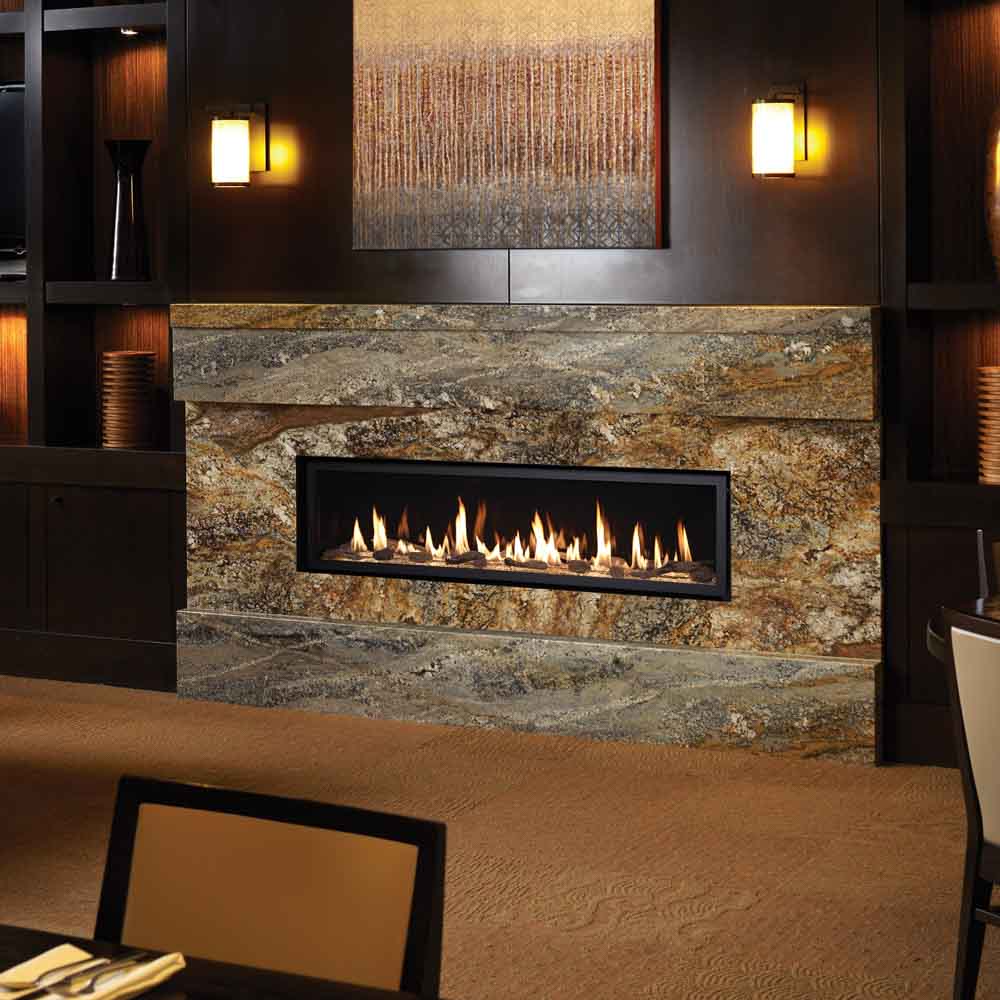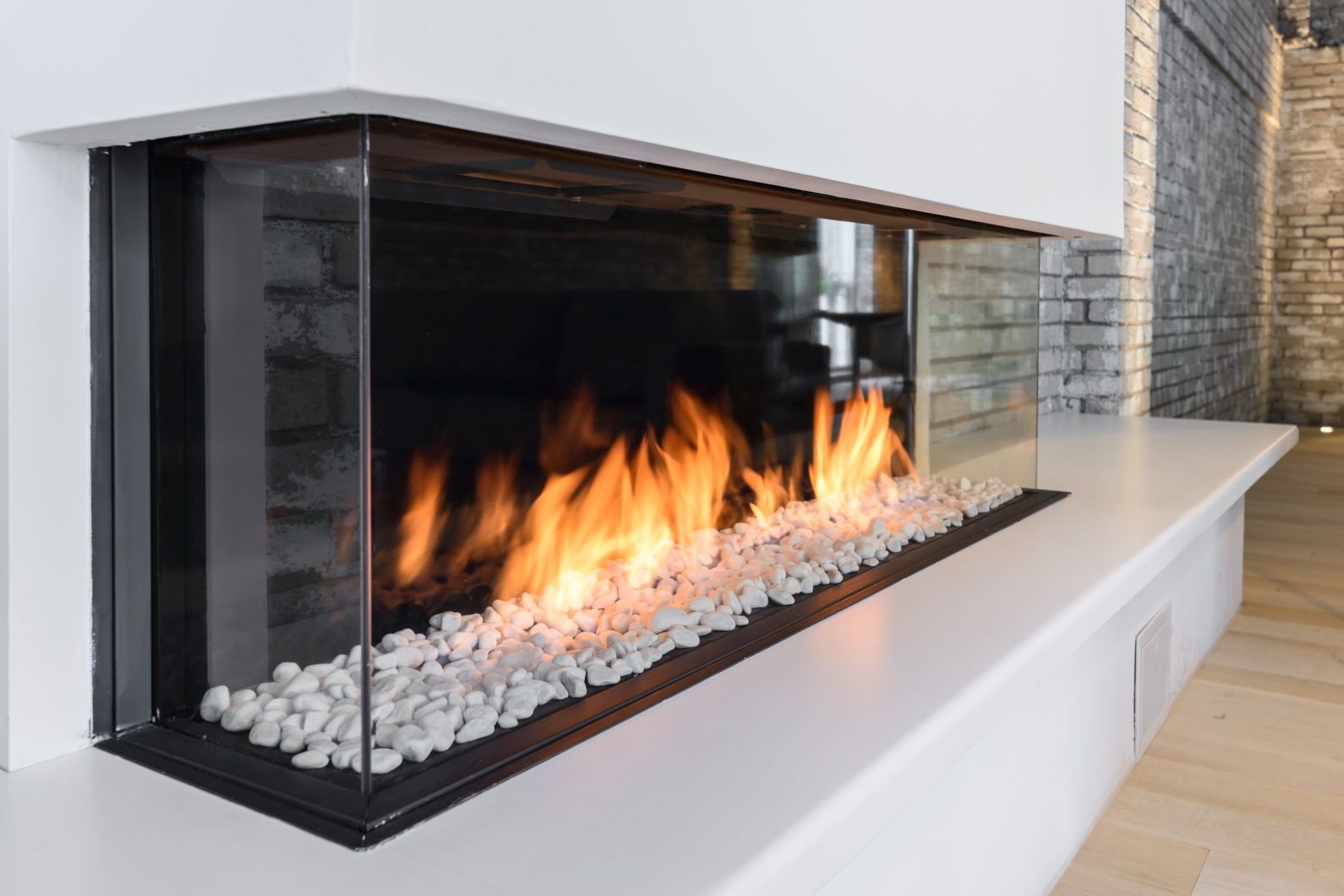Linear Gas Fireplace Insert
Linear gas fireplace inserts have become a popular choice for homeowners seeking a sleek, modern heating solution. These inserts offer both style and efficiency, making them ideal for contemporary home designs. By replacing traditional wood-burning or older gas fireplaces with linear gas inserts, homeowners can enjoy the aesthetic appeal of a streamlined fire feature while benefiting from cleaner, more efficient heating. Let’s see what makes linear gas fireplace inserts unique, their advantages, and how to choose and maintain the right one for your home.

What Is a Linear Gas Fireplace Insert?
A linear gas fireplace insert is a retrofit unit designed to fit into an existing masonry or metal fireplace opening. These inserts are long and narrow, offering a modern design that contrasts with the square or rectangular shape of traditional fireplaces. Unlike wood-burning or older gas fireplaces, linear inserts utilize clean-burning gas as a fuel source, often powered by natural gas or propane. They can be controlled through remote operation or smart technology, providing both convenience and customization.
One of the key features of linear gas fireplace inserts is their sleek, horizontal appearance. They are designed to create a minimalist look, with clean lines and glass fronts that emphasize the flames within. Many models offer a frameless design that enhances their modern appeal, making them ideal for homes with contemporary decor. This design allows for maximum visibility of the flames, which can be customized in terms of size, shape, and color, depending on the model.
Linear gas fireplace inserts are also known for their versatility. Available in various lengths, ranging from 30 inches to over 80 inches, they can fit different space requirements. Additionally, they can be vented through a chimney or utilize direct-vent technology, which draws air from outside and expels exhaust, making them a safe and efficient heating option for homes without existing chimneys.

Advantages of Linear Gas Fireplace Inserts
One of the primary advantages of linear gas fireplace inserts is their efficiency. Unlike traditional wood-burning fireplaces that lose much of their heat through the chimney, gas inserts are sealed units that retain and distribute heat more effectively. This helps reduce energy costs and provides consistent warmth throughout the room. Many models come with built-in fans to circulate heat more efficiently, ensuring that your living space remains cozy without the hassle of chopping wood or cleaning ash.
Another significant advantage is the ease of use. Linear gas fireplace inserts are operated through remote controls, wall switches, or even smartphone apps, allowing users to ignite the flames, adjust the temperature, and control the intensity of the fire with just a few clicks. This convenience is a major selling point for busy homeowners who want to enjoy the ambiance of a fire without the maintenance and effort required for wood-burning models.
Aesthetic appeal is another benefit of linear gas fireplace inserts. The long, horizontal shape creates a stunning visual effect, making the fireplace a centerpiece of any room. The flame can be customized to suit your preferences, from traditional orange and yellow flames to more modern blue or purple hues. The design flexibility allows homeowners to create the perfect atmosphere, whether it’s a romantic evening or a cozy family gathering.

How to Choose the Right Linear Gas Fireplace Insert
When choosing a linear gas fireplace insert, one of the first considerations is the size of the unit. Linear inserts come in various lengths and can be selected based on the dimensions of your existing fireplace or the space available in your room. It’s important to measure the width, height, and depth of your current fireplace opening to ensure a proper fit. For new installations, consider how the length of the insert will complement the layout of your room. Longer inserts can make a dramatic statement in large spaces, while smaller models may be better suited to more intimate settings.
The type of venting is another critical factor. Linear gas inserts can be vented using either direct-vent or vent-free technology. Direct-vent systems are the most popular option as they offer a sealed combustion system, meaning they draw in outside air for combustion and expel exhaust through a vent, minimizing indoor air pollution. This makes them a safer and more efficient option. Vent-free inserts, on the other hand, do not require external venting, which offers flexibility in terms of installation but may raise concerns about indoor air quality due to the lack of exhaust removal.
Last, consider the features and finishes available for your linear gas insert. Many models come with a variety of customization options, including different flame settings, LED lighting, and media choices such as ceramic logs, glass pebbles, or river stones. You can also select finishes that match your home’s decor, such as black, stainless steel, or bronze. Some models even allow for integration with smart home systems, enabling you to control your fireplace from anywhere using a smartphone or tablet.

Installation Considerations
Installing a linear gas fireplace insert requires careful planning to ensure proper fit, ventilation, and safety. If you are retrofitting an existing fireplace, the first step is to confirm that the opening is compatible with the insert size. A professional installer can assess your fireplace and make any necessary adjustments to accommodate the insert. It’s important to ensure that the insert is properly sealed and vented to prevent heat loss and maintain indoor air quality.
For new installations, you’ll need to decide on the placement of the fireplace in your room. Linear inserts are often installed on interior walls or as part of a built-in entertainment unit. Consider the overall layout of your room and how the fireplace will interact with other elements, such as seating arrangements, lighting, and decor. Electrical and gas line connections will also need to be planned, as these are necessary to power the insert’s features and ensure safe operation.
Permits and inspections may be required depending on your local building codes. Hiring a professional installer who is familiar with gas fireplace installation is highly recommended, as they can ensure that the unit is installed safely and meets all necessary regulations. Once installed, your linear gas fireplace insert will provide years of efficient heating and beautiful design, adding both value and comfort to your home.

Maintenance of Linear Gas Fireplace Inserts
Although linear gas fireplace inserts require less maintenance than traditional wood-burning fireplaces, regular care is still essential to ensure their longevity and optimal performance. One of the primary maintenance tasks is cleaning the glass front. Over time, residue from the flames can build up on the glass, reducing the clarity of the view. Cleaning the glass every few months with a non-abrasive cleaner will help keep it looking clear and bright.
It’s also important to check the burner and pilot light regularly. Dust and debris can accumulate over time, potentially affecting the performance of the flames. Most manufacturers recommend annual inspections by a professional technician to clean the burner and inspect the gas lines for leaks or blockages. This routine check will help ensure that your fireplace continues to operate safely and efficiently.
Finally, keeping the surrounding area clean and free of debris is essential for safety. Ensure that nothing flammable is stored near the fireplace, and inspect the venting system for any signs of wear or blockages. With proper maintenance, a linear gas fireplace insert can provide reliable heat and a beautiful ambiance for many years.

Enhancing Your Home with a Linear Gas Fireplace Insert
Incorporating a linear gas fireplace into your home can significantly enhance both the aesthetic appeal and functionality of your living space. The sleek, modern design of these fireplaces creates a focal point that adds visual interest to any room. Whether installed in a living room, bedroom, or even an outdoor patio, a linear gas fireplace can transform the space with its clean lines and captivating flames.
Beyond aesthetics, these inserts provide efficient heating that can supplement your home’s primary heating system. By directing heat where it’s needed most, such as in commonly used living areas, you can reduce your reliance on central heating, which can lead to lower energy bills. Additionally, the ability to control the flame settings allows you to customize the heat output, creating the perfect environment for any occasion.
Linear gas fireplace inserts also contribute to a more comfortable and enjoyable atmosphere. The mesmerizing flames offer a sense of relaxation and tranquility, making your home feel cozy and inviting. Whether you’re entertaining guests or enjoying a quiet evening with family, a linear gas fireplace adds warmth and ambiance that enhances the overall experience.

IHP Superior DRL6500 Direct Vent Linear Louverless Gas Fireplace

Marquis Serene 47″ Linear Gas Fireplace Safe Home Fireplace

High Output Linear Gas Fireplaces – American Heritage Fireplace

gas fireplace – North Forge fireplaces, inserts, stoves

Stunning Modern Gas Fireplaces in Public Spaces

Fireplace Inserts: March

Related Posts:
- Lopi Gas Fireplace Insert Reviews
- Fireplace Insert Problems
- King Blaze Fireplace Insert
- Faux Fireplace Insert
- Outdoor Wood Burning Fireplace Insert
- Fireplace Insert Trim Ideas
- Black Fireplace Insert
- Small Fireplace Inserts for Gas
- Fireplace Insert Trim Kit
- Empire Natural Gas Fireplace Inserts
Linear gas fireplace inserts are a popular choice for homeowners looking to add both warmth and style to their living spaces. These sleek, modern fireplaces offer the convenience of gas fuel with the aesthetic appeal of a traditional fireplace. In this guide, we will explore the benefits, pros and cons, common mistakes to avoid, and frequently asked questions about linear gas fireplace inserts.
Benefits of Linear Gas Fireplace Inserts
Energy Efficiency: One of the main benefits of linear gas fireplace inserts is their energy efficiency. These units are designed to provide consistent heat without losing energy through a chimney or flue. This can help reduce your heating costs and make your home more environmentally friendly.
Easy Installation: Linear gas fireplace inserts are relatively easy to install compared to traditional wood-burning fireplaces. They can be installed in a variety of locations, including existing fireplaces, or built into a wall for a seamless look.
Customizable Design: Another benefit of linear gas fireplace inserts is their customizable design options. From sleek, modern styles to more traditional looks, there are plenty of options to choose from to match your home decor.
Convenient Operation: Gas fireplaces are easy to operate with just the flip of a switch or a press of a button. This makes it simple to enjoy the comfort and ambiance of a fire without the hassle of chopping wood or cleaning up ash.
Pros and Cons of Linear Gas Fireplace Inserts
Pros:
1. Cleanliness: Gas fireplaces do not produce ash or soot like wood-burning fireplaces, making them easier to maintain.
2. Safety: With no open flame or sparks, gas fireplaces are considered safer than traditional wood-burning options.
3. Heat Efficiency: Gas fireplaces provide consistent heat output and can be controlled with precision for optimal comfort.
4. Aesthetics: Linear gas fireplace inserts offer a modern and sleek look that can enhance the overall appeal of your home.
Cons:
1. Cost: While the initial cost of a gas fireplace insert may be higher than some other heating options, the long-term savings on fuel and maintenance costs can offset this expense.
2. Limited Fuel Source: Gas fireplace inserts require access to natural gas or propane, which may not be readily available in all areas.
3. Ventilation Requirements: Proper ventilation is necessary when installing a gas fireplace insert to ensure safety and prevent carbon monoxide buildup.
4. Maintenance: Regular maintenance is required to keep a gas fireplace insert running smoothly, including cleaning the glass and checking for leaks.
Common Mistakes to Avoid
1. Neglecting Professional Installation: It is essential to have a qualified professional install your linear gas fireplace insert to ensure proper venting and safe operation.
2. Ignoring Maintenance Needs: Regular maintenance, such as cleaning the glass and checking for leaks, is crucial for the safe and efficient operation of your gas fireplace insert.
3. Overlooking Ventilation Requirements: Proper ventilation is necessary to prevent carbon monoxide buildup when using a gas fireplace insert.
4. Failing to Read the Manual: Be sure to read the manufacturer’s instructions carefully before operating your linear gas fireplace insert to avoid any potential hazards.
Can I convert my existing wood-burning fireplace to a gas fireplace insert?
Yes, many wood-burning fireplaces can be converted to accept a gas fireplace insert with the help of a professional installer.
Are linear gas fireplace inserts energy-efficient?
Yes, linear gas fireplace inserts are known for their energy efficiency compared to traditional wood-burning fireplaces.
Do I need a chimney for a linear gas fireplace insert?
No, linear gas fireplace inserts do not require a chimney for venting as they can be directly vented through an exterior wall.
How often should I have my linear gas fireplace insert serviced?
It is recommended to have your gas fireplace insert serviced annually by a qualified technician to ensure safe and efficient operation.
Can I control the heat output of my linear gas fireplace insert?
Yes, most linear gas fireplace inserts come equipped with adjustable heat settings so you can control the level of warmth in your space easily.
Linear gas fireplace inserts offer numerous benefits such as energy efficiency, easy installation, customizable design options, and convenient operation. While there are some drawbacks to consider, such as initial cost and maintenance requirements, these units provide an elegant and practical heating solution for modern homes. By avoiding common mistakes like neglecting professional installation and maintenance needs, homeowners can enjoy the warmth and ambiance of a linear gas fireplace insert safely for years to come.
If you are considering adding a linear gas fireplace insert to your home, make sure to do thorough research and consult with a professional to ensure the best fit for your space and needs. With proper installation, maintenance, and operation, a linear gas fireplace insert can be a valuable addition to your home that provides both comfort and style. Whether you are looking to upgrade an existing fireplace or add a new focal point to your living space, a linear gas fireplace insert is a versatile and efficient choice that can enhance the overall ambiance of your home.
Overall, a linear gas fireplace insert can be a great addition to your home, providing both warmth and style. By understanding the benefits, pros and cons, common mistakes to avoid, and frequently asked questions, you can make an informed decision about whether a linear gas fireplace insert is the right choice for your space. Remember to consult with a professional for installation and maintenance to ensure the safe and efficient operation of your gas fireplace insert. With proper care and attention, your linear gas fireplace insert can be a beautiful and functional feature in your home for years to come.
Additional Tips:
– Consider the size and layout of your space when choosing a linear gas fireplace insert to ensure it fits appropriately and provides optimal heat distribution.
– Research different brands and models to find one that meets your aesthetic preferences and heating needs.
– Keep in mind the ongoing costs associated with operating a gas fireplace insert, such as fuel, maintenance, and repairs.
– Regularly clean and inspect your gas fireplace insert to ensure it continues to operate safely and efficiently.
– Be mindful of any safety precautions and guidelines provided by the manufacturer to prevent accidents or damage.
By considering these factors and taking the necessary precautions, you can enjoy the warmth and beauty of a linear gas fireplace insert in your home for years to come.